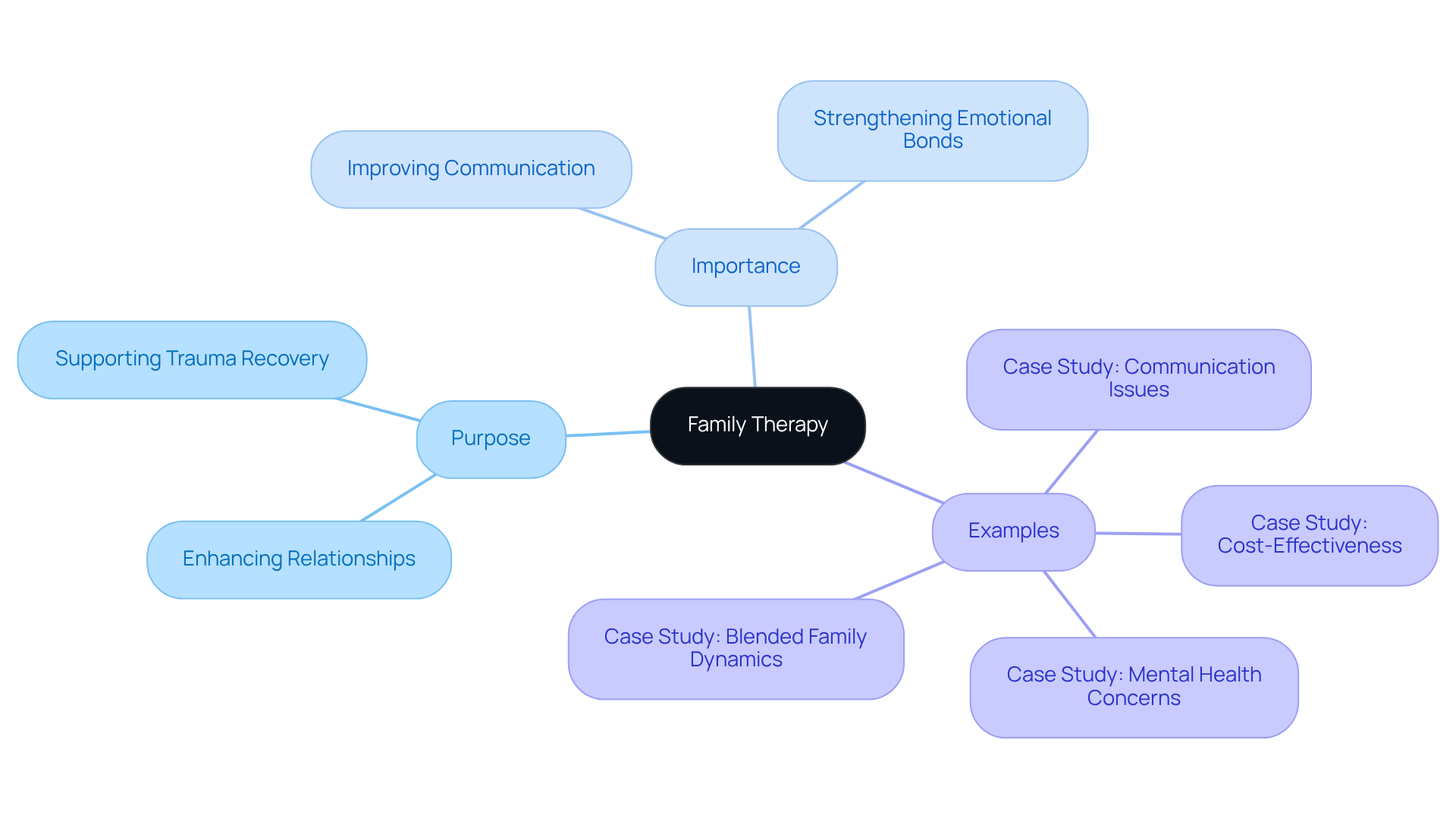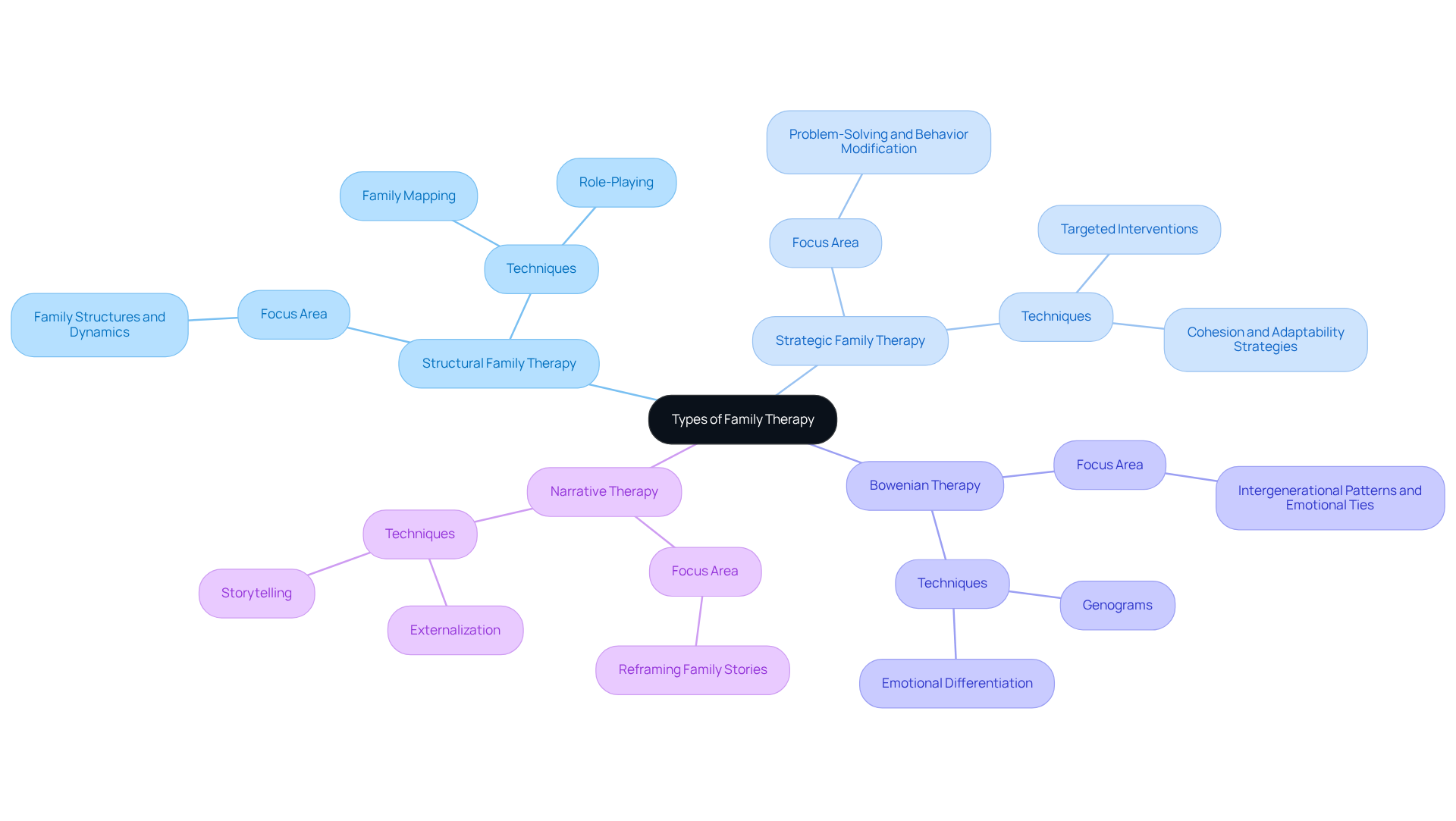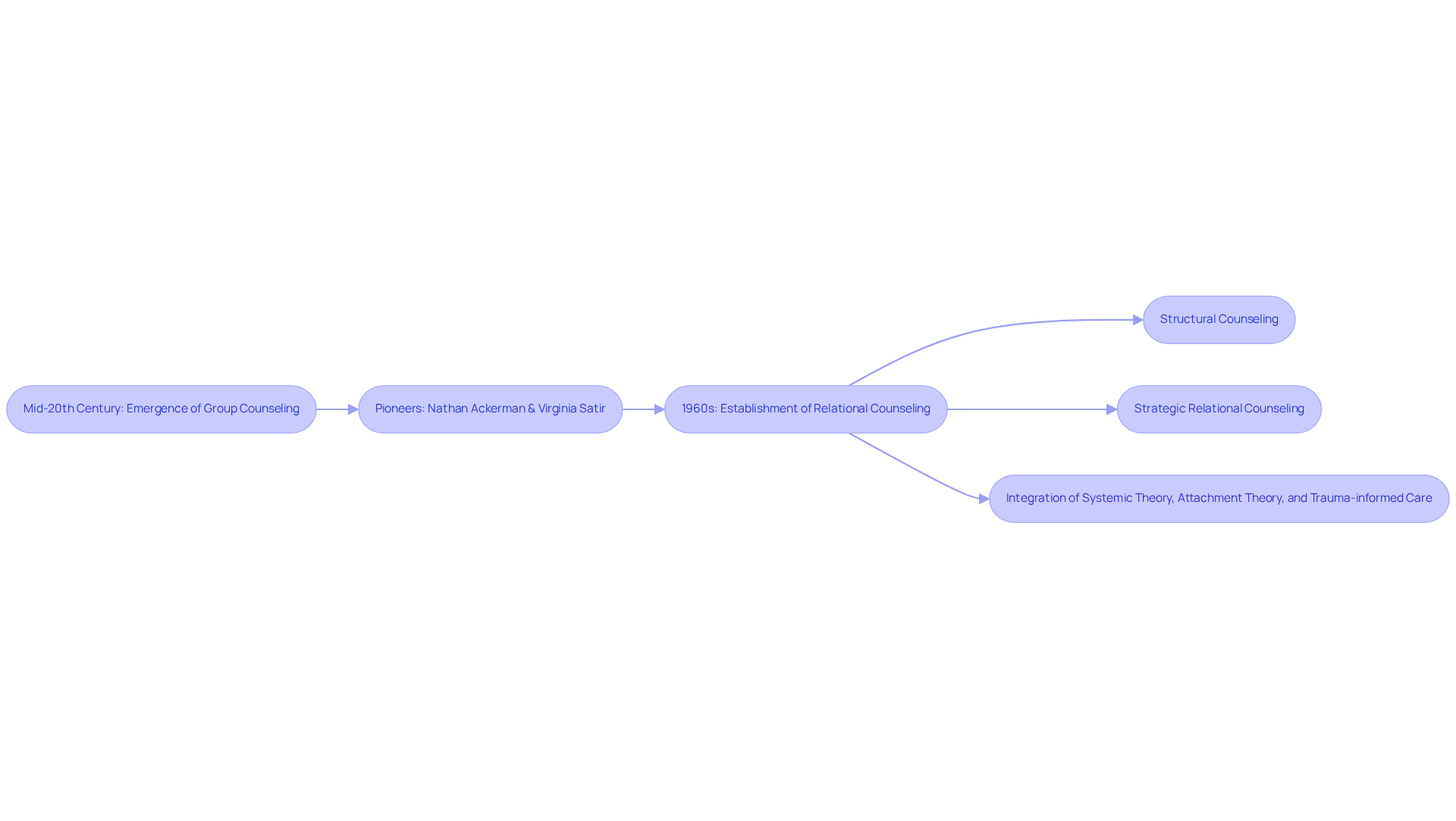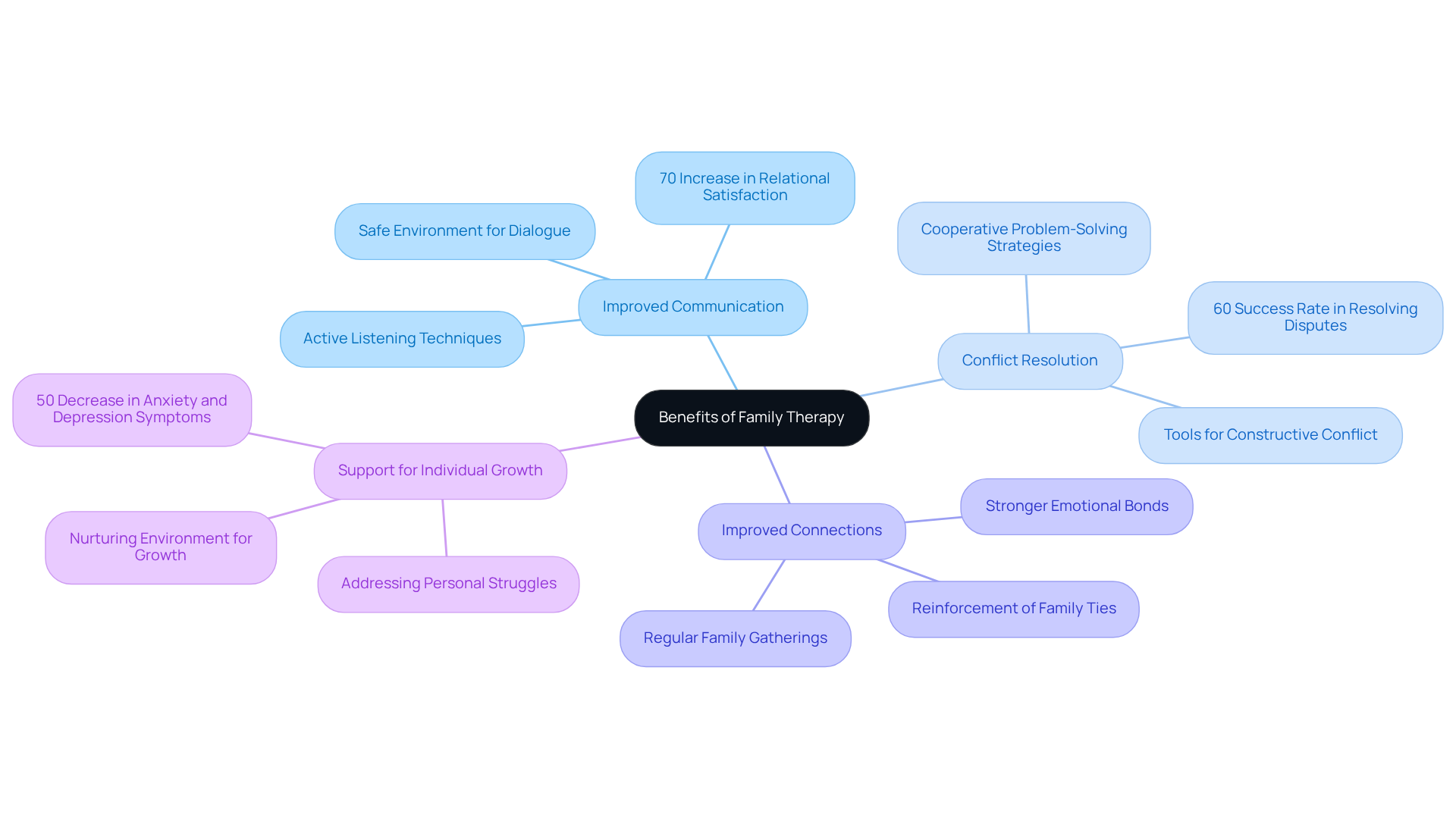Overview
This article gently explores the various types of family therapy, highlighting their key approaches and the profound benefits they offer to families. Have you ever felt the weight of unresolved conflicts within your family? Different therapeutic methods, such as Structural Family Therapy and Bowenian Therapy, are designed to enhance communication, resolve conflicts, and support individual growth within familial relationships. These approaches ultimately lead to healthier dynamics and improved emotional well-being. As we delve deeper into these therapeutic options, we invite you to consider how they might bring healing to your family.
Introduction
Family therapy serves as a crucial resource for families striving to navigate the complexities of relationships and emotional challenges. By exploring various approaches, such as structural and narrative therapy, families can discover new pathways to understanding and healing.
Have you ever felt overwhelmed by your past? This question invites reflection on the potential for transformation. Amidst the promise of improved communication and conflict resolution, one important question arises: how can these therapeutic techniques truly reshape the dynamics within a family, especially in the face of trauma?
As we explore this further, we can uncover the profound impact that therapy can have on fostering connection and resilience.
Define Family Therapy: Understanding Its Purpose and Importance
Group counseling is one of the types of family therapy that serves as a nurturing form of psychotherapy designed to enhance relationships and communication among family members. Unlike traditional therapy, which often focuses on individual issues, like group counseling address the shared dynamics that shape the family unit. This approach is particularly vital for families navigating trauma, as it fosters a supportive environment where individuals can openly share their experiences and perspectives. By cultivating understanding and compassion, relational counseling not only aids in resolving conflicts but also strengthens emotional connections, paving the way for healing and resilience.
Have you ever felt overwhelmed by your past? Studies reveal that group counseling can significantly improve family interactions, equipping families with essential conflict resolution skills. For instance, research has shown that families engaging in counseling report better communication and a reduction in ongoing disputes. This is especially important in the context of trauma recovery, where understanding and support are crucial. The positive effects of group counseling, as one of the types of family therapy, extend beyond the therapy sessions, often resulting in lasting improvements in family dynamics and overall well-being.
Practical examples underscore the transformative power of relational counseling. One family, grappling with the aftermath of a traumatic event, found that counseling helped them articulate their emotions and rebuild trust. This not only improved their interactions but also fostered a deeper emotional bond among family members. Such outcomes highlight the importance of types of family therapy as a valuable resource for emotional recovery and the development of healthier family dynamics. As we explore this further, consider how group counseling might support your family's journey towards healing.

Explore Types of Family Therapy: Key Approaches and Techniques
When it comes to types of family therapy, there are several key approaches, each offering unique techniques and focus areas that can truly make a difference. Some of the most common types include:
- Structural Family Therapy: Developed by Salvador Minuchin, this approach gently examines family structures and dynamics, focusing on the boundaries and hierarchies that exist within the family unit. Have you ever felt that certain patterns in your family might be holding you back?
- Types of family therapy, including Strategic Family Therapy, emphasize the importance of problem-solving and aim to modify specific behaviors within the group through targeted interventions. It encourages families to work together towards solutions that foster harmony.
- Bowenian Therapy: Established by Murray Bowen, this method is one of the types of family therapy that explores intergenerational patterns and emotional ties, helping families understand how past experiences shape present actions. Reflecting on these connections can be a powerful step towards healing.
- Types of family therapy: One of the types of family therapy is narrative therapy, which invites families to reframe their stories and experiences, allowing them to gain new perspectives and foster healing. What if you could rewrite your family narrative in a way that brings hope and understanding?
Each of these types of family therapy can effectively address various domestic issues, including trauma, communication breakdowns, and behavioral problems. As you consider these therapeutic options, remember that seeking help is a courageous step towards healing and connection.

Trace the Evolution of Family Therapy: Historical Context and Development
Group counseling emerged as a unique practice in the mid-20th century, shaped by various psychological theories and societal changes. Pioneers such as Nathan Ackerman and Virginia Satir highlighted the vital role of relational dynamics in individual mental well-being, laying a compassionate foundation for this therapeutic method.
Have you ever felt the weight of your relationships on your mental health? The 1960s marked a significant turning point with the establishment of relational counseling as a dedicated field, introducing important types of family therapy, such as Structural and Strategic Relational Counseling.
As we explore this further, the field evolved by integrating insights from systemic theory, attachment theory, and trauma-informed care, reinforcing its importance in contemporary psychotherapy. This evolution reflects a growing awareness of how impact personal well-being, making the types of family therapy an invaluable resource for addressing complex emotional and psychological challenges.
In seeking support, remember that you are not alone on this journey; there are compassionate professionals ready to help you navigate your path to healing.

Highlight Benefits of Family Therapy: Impact on Families and Individuals
The types of family therapy provide a range of significant benefits that can transform family dynamics and individual well-being, especially for parents navigating postpartum challenges such as postpartum depression and anxiety.
- Improved Communication: At The Emerald Couch, therapy sessions create a safe environment where family members can articulate their thoughts and feelings, fostering open dialogue. This approach enhances understanding and empathy, which are crucial for healthy relationships. Have you ever felt that your family struggles to communicate effectively? Studies show that households participating in counseling observe a significant rise in effective communication, resulting in a 70% enhancement in relational satisfaction. Frequent gatherings can further facilitate this open communication, allowing relatives to address concerns collaboratively.
- Conflict Resolution: One of the types of family therapy, family counseling equips members with essential tools to address and resolve conflicts constructively. By concentrating on cooperative problem-solving, families can decrease tension and encourage harmony. Information indicates that households engaging in counseling report a 60% success rate in resolving disputes, markedly higher than those who do not seek professional assistance. Incorporating strategies such as active listening can enhance types of family therapy efforts, inviting a more peaceful home atmosphere.
- Improved Connections: By examining fundamental issues and dynamics, familial counseling aids in reinforcing ties among members. This process not only addresses immediate concerns but also fosters long-term relational health by utilizing different types of family therapy. Have you noticed a distance growing between family members? Case studies show that households who participate in counseling frequently report enhanced relationships, with many mentioning a stronger emotional bond and reciprocal respect. Approaches for strengthening connections among relatives, such as planning regular gatherings, can further enhance these relationships.
- Support for Individual Growth: Acknowledging that personal struggles, including postpartum difficulties, often impact the household, assistance at The Emerald Couch fosters personal development within a nurturing environment. This comprehensive method enables relatives to address their challenges while benefiting from the shared support of their loved ones. Research shows that people in group counseling, one of the types of family therapy, experience a 50% decrease in symptoms of anxiety and depression, emphasizing the intervention's dual effect on individual and relational well-being. Virginia Satir emphasized that "feelings of worth can flourish only in an atmosphere where individual differences are appreciated, mistakes are tolerated, communication is open, and rules are flexible," underscoring the importance of a .
In conclusion, relational counseling at The Emerald Couch can lead to healthier dynamics, improved mental health outcomes, and a greater sense of connection among relatives. This makes it a valuable resource for those looking to enhance their connections. As George Bernard Shaw noted, "A happy family is but an earlier heaven," reflecting the positive outcomes that can arise from engaging in family therapy.

Conclusion
Family therapy serves as a vital intervention that nurtures healing and connection within familial relationships. By emphasizing shared experiences and open communication, various types of family therapy, such as group counseling, equip families with the tools to navigate challenges together. This collaborative approach ultimately promotes resilience and emotional well-being.
As we explore this further, the article highlights several key approaches to family therapy, including:
- Structural Family Therapy
- Strategic Family Therapy
- Bowenian Therapy
- Narrative Therapy
Each of these modalities offers unique techniques that address specific issues, from exploring family dynamics to reframing narratives. These methods enhance understanding and cooperation among family members, fostering a supportive environment. The historical evolution of family therapy underscores its growing significance in addressing complex emotional challenges, showcasing how relational dynamics profoundly impact individual mental health.
Engaging in family therapy is not merely about resolving conflicts; it is a transformative journey that strengthens connections and fosters personal growth. Have you ever felt overwhelmed by your past? Families are encouraged to embrace the support available through these therapeutic approaches, as the benefits extend beyond the therapy room, leading to lasting improvements in relationships and overall family dynamics. By taking the courageous step to seek help, families can cultivate an environment where understanding, empathy, and love flourish, paving the way for a healthier, happier family life.
Frequently Asked Questions
What is family therapy?
Family therapy is a form of psychotherapy designed to enhance relationships and communication among family members, focusing on shared dynamics rather than individual issues.
What is group counseling in the context of family therapy?
Group counseling is a type of family therapy that provides a supportive environment for family members to share their experiences and perspectives, particularly useful for families navigating trauma.
How does family therapy benefit families dealing with trauma?
Family therapy fosters understanding and compassion, aids in conflict resolution, and strengthens emotional connections, which are essential for healing and resilience in the context of trauma recovery.
What are the positive effects of group counseling on family interactions?
Group counseling can significantly improve family interactions by enhancing communication, equipping families with conflict resolution skills, and reducing ongoing disputes.
Can the benefits of group counseling extend beyond therapy sessions?
Yes, the positive effects of group counseling often result in lasting improvements in family dynamics and overall well-being beyond the therapy sessions.
Can you provide an example of how family therapy has transformed family dynamics?
One family dealing with the aftermath of a traumatic event found that counseling helped them articulate their emotions and rebuild trust, leading to improved interactions and a deeper emotional bond among family members.




